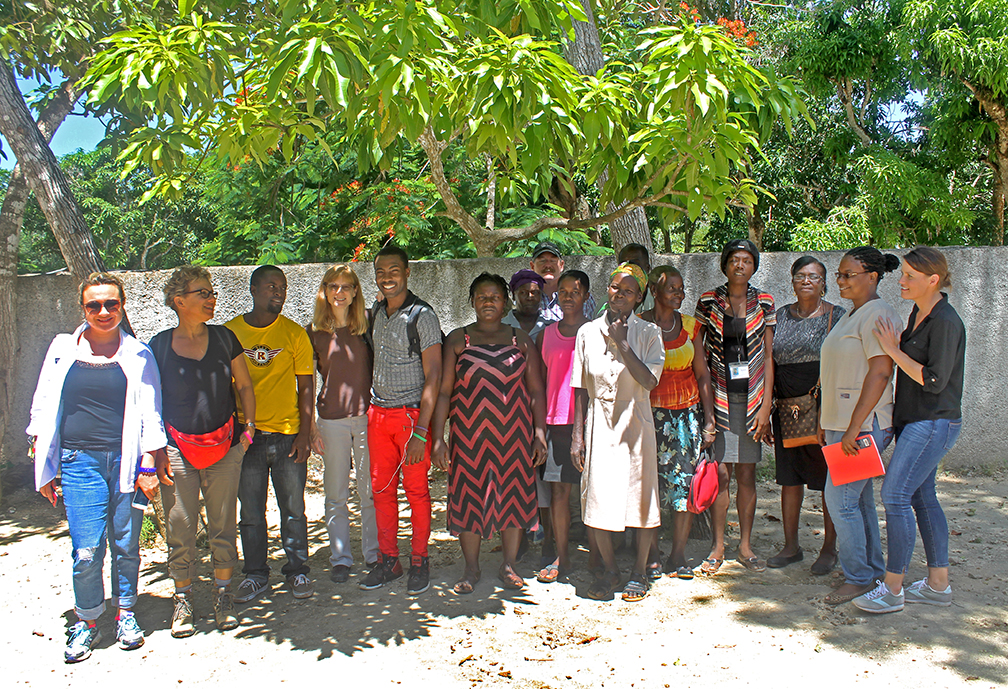Researchers Take a TEAM Approach to Haiti’s Development Challenges
October 5, 2017

Haiti has been the focus of international development assistance for decades. Despite countless efforts, life is still tenuous for its 10.5 million citizens.
A group of Virginia Tech faculty and students traveled to Haiti in August to test a development model that may bring sustainable change to Haiti’s rural communities.
Based on Virginia Tech’s community development model in Malawi called TEAM Malawi, TEAM Haiti formed to assess whether the components of the TEAM approach — technology, education, advocacy, and medicine — could work in the Caribbean nation.
The Office of International Research, Education, and Development (OIRED) sponsored the group’s scoping mission.
“The model focuses on close collaboration among local partners, people in communities, and faculty and students from the TEAM disciplines,” said Van Crowder, executive director of OIRED. “The idea was to see if the model can help improve food security, agricultural sustainability, nutrition, health, and education for people in Haiti.”
Faculty and students on the Haiti trip were:
- Laura Zanotti, an associate professor in the Department of Political Science in the College of Liberal Arts and Human Sciences;
- Wade E. Thomason, a professor in the Department of Crop and Soil Environmental Sciences in the College of Agricultural and Life Sciences;
- Andy Muelenaer, an associate professor of pediatrics in the Virginia Tech Carilion School of Medicine;
- Kathy Hosig, director of the Center for Public Health Practice and Research in the Virginia-Maryland College of Veterinary Medicine;
- Junior Beauvais, from Fondwa, Haiti, a master’s student in the Department of Agricultural, Leadership, and Community Education; and
- Sara Simeunovic, from Chicago, a master’s student in the Department of Political Science.
Zanotti and Thomason led the mission, and Beauvais arranged meetings and logistics while also helping the team understand the cultural landscape. He also is known for an international award he won for setting up a seed bank to help farmers retrieve heirloom black bean seeds.
The trip’s start in Port-au-Prince included a meeting with Paula Caldwell St-Onge, Canadian ambassador to Haiti, who offered perspectives on the political and economic climate and shared contacts for potential collaboration.
Working with Virginia Tech’s long-term partners at the University of Fondwa, the group undertook a needs assessment. A community of approximately 10,000 people, Fondwa is a key food producer for Haiti. Like much of the country, it faces steep challenges. Pregnant women and infants die at some of the highest rates in the world. Food grows in abundance part of the year but can’t always be properly stored and preserved.
In the community of Cherident, where Simeunovic works with the organization Haiti Heathcare Partners, the team visited a health clinic and met with midwives, or matwons. Most women in rural areas give birth at home, and matwons often travel long distances to help them. The matwons, who are all volunteers, need small stipends and training that integrates traditional skills with modern medicine so they can continue to provide their vital service, Simeunovic said.
One of the team’s more powerful encounters occurred when the team was “meeting with farmers at a technical school when the facilitator said, ‘There’s a church gathering and they want to meet with you,’” Thomason recalled. When the team went to the nearby open-air church, the pastor stopped the service and invited the group to hear parishioners’ concerns about lack of proper health care, nutrition, and education for their children.
The team identified the need for the type of extension, engagement, and outreach activities undertaken in the United States by land-grant universities, such as Virginia Tech, including training in agriculture, health, and business management. A potential partnership with the University of Fondwa and other groups could develop such programs, group members said.
Muelenaer said he saw potential collaborations in many encounters, such as when he learned that access to health care could involve as much as two hours of travel by bike or motorcycle or even longer by donkey. Virginia Tech students’ creativity might be brought to bear if, collaborating with local health organizations, they could use GIS data to map health resources and develop motorcycle- and bicycle-based ambulances.
Zanotti said she plans to work some of her findings from the trip into her teaching to challenge students “to devise sustainable community-based development possibilities in the context of lack of governance and scarcity of resources.”
In Blacksburg, the team’s next steps are to reflect upon their experiences and connections, refine recommendations, and work with the Office of International Research, Education, and Development to develop a strategy to obtain funding for a Virginia Tech TEAM Haiti project.
“The TEAM philosophy fits in Haiti,” Muelenaer said. “What I saw reinforces the model itself and shows how, with some modifications, it can be used effectively in Haiti.”
The Office of International Research, Education, and Development is part of Outreach and International Affairs.
Written by Dana Cruikshank







